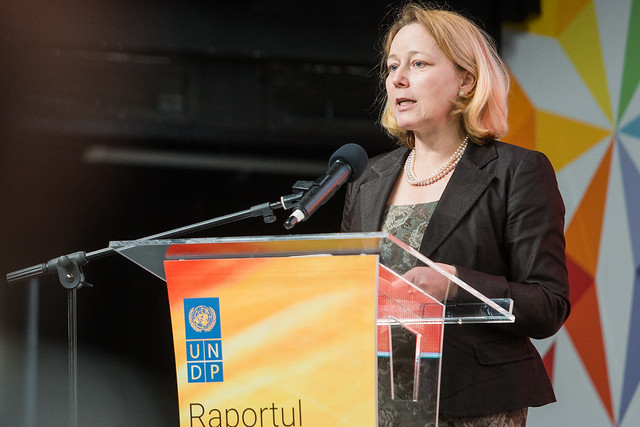Republic of Moldova has lost 10.4% of its human development due to inequalities and, currently, ranks 107 out of 189 countries and territories as per the Human Development Index (HDI). HDI measures national progress in health, education and income. Most inequalities in Moldova are derived from the inequalities in income (14%), inequality in life expectancy at birth (9.6%) and inequality in education (7.3%).
Addressing inequalities requires a mix of new inclusive policy measures, new partnerships and above all an understanding of “what really people need to be able to live long, health and productive life”. Governments, together with all relevant stakeholders at all levels, should unpack the complexity of inequalities, including going “beyond income and averages”, and identify and test innovative solution to curb inequalities in the country.
These are the conclusions of the national launch of the Global Human Development Report, conducted on 20 February 2020, the World Day of Social Justice. The event was attended by 200 participants, including representatives of the Government, development partners and civil society.
“We will certainly take into account recommendations aimed at reducing existing inequalities, as well as the risks of other ones, that were presented in the Global Human Development Report. We share our vision with the development partners because, with their support, we will be able to quickly achieve the reduction of inequality between the Republic of Moldova and developed countries. With their assistance we will soon succeed in convincing our young people to choose Moldova,” said Ion Chicu, the Prime-Minister of the Republic of Moldova.
“Inequality is not just about how much someone earns compared to their neighbour. It is about the unequal distribution of wealth and power, the entrenched social and political norms and policies that inherently fail to address the emerging challenges. Increasingly, these issues are bringing people onto the streets in cities and towns across the world, and the triggers that will do so in the future unless something changes,” noted Agi Veres, UNDP Deputy Director for Europe and the CIS.
Non-income inequalities and other forms of inequalities might undermine the achievements in sustainable development of the country, according to the UNDP Global Human Development Report. In particular, in the context of urban development and growing urban population, the risks of food and energy poverty are very high. UNDP Moldova is currently working on using available evidence to understand these challenges and identify relevant solutions, together with its partners.
There does not exist one ‘silver bullet’ policy option to solve all existing inequalities in Moldova. However, policy makers have at disposal a menu of policy options that can be applied to address inequalities. The worrisome demographic trends, the migration, brain drain and ageing population, competitiveness of economy, unemployment and mismatch of skills, innovation and technological transfer are among most pressing challenges to be addressed.
The recent analytical work by UNDP Moldova on “Inequalities in rural and urban Moldova” contains several policy recommendations for tackling existing and potential new forms of inequalities, in particular:
- Incorporate the objective of reducing inequalities in the existing policy framework in areas of social protection, inclusion, non-discrimination, business development, health, education, mobility, etc.; Special attention should be paid to intersecting inequalities, and factors driving inequalities (i.e. rule of law, territorial disparities, mobility barriers). This could be achieved only through integrated policies, which understand and address causes of inequality in a comprehensive yet pragmatic way.
- Support development and implementation of policies of social inclusion and shared economic growth (including local economic growth), without increasing the fees and income taxes if we would like to operate within the existing fiscal space; support policies to reduce or minimize territorial disparities and inequalities;
- Key municipalities to design and consult local development strategies to localize the Sustainable Development Goals, by also making sure that such strategies address existing and possibly emerging inequalities in urban context;
- Anticipate and develop scenarios for fighting emerging forms of inequalities, in particular in urban contexts, driven by food and energy poverty;
- Ensure the principle of equity and equality for all, in the strategies and programs related to the promotion of life-long learning and access to education without any discriminations;
- Develop policies to foster increased access to vocational education programs and requalification, and validation of previous studies particularly for the socially vulnerable groups;
- Develop targeted policies for the inclusion of NEETs (Not in Education, Employment, or Training) in the education programs or job market.
Following this event, UNDP Moldova intends to launch a series of 2020 national debates with the focus on challenges and solutions in addressing inequalities in the Republic of Moldova.
****
Access 2019 HDR Broadcast Package
Download here the Briefing Note on the Republic of Moldova.

 Locations
Locations





